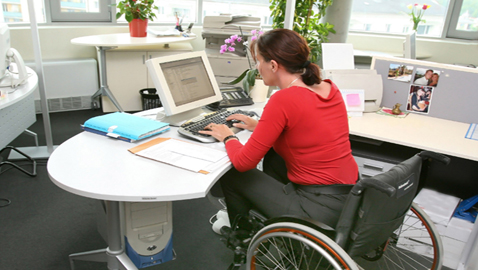Appeals Court Rewrites Reassignment Rules For Disabled Employees: They Can Now Insist That They Be Considered Before Anyone Else
Post Views 2
A federal appeals court has re-energized an Equal Employment Opportunity Commission lawsuit against United Airlines Inc, and said that not only should employers reassign disabled workers to vacant jobs for which they are qualified, in some cases disabled workers must get preferential treatment.
The 7th Circuit Court of Appeals in a 12 year old case was in consonance with an EEOC contention that a disabled employee seeking a job transfer should be “advanced over a more qualified non-disabled person, provided only that the disabled person is at least minimally qualified to do the job.”
In layman terms this means that even if there is a more qualified person to fill the job, the job goes to the disabled employee whose transfer has been approved, unless an employer can prove hardship.
In 2003, United Airlines set out its guidelines that took into account the reasonable accommodation of disabled employees. The guidelines said that that a transfer to an equivalent position may be a reasonable accommodation, but only if they merited it and that it would go to the most deserving person.
In brief this is what led to this ruling? Lead plaintiff Joe Boswell, was a mechanic at the airlines at San Francisco International Airport for more than a decade. He had alleged that the carrier had refused to provide him with a new job, when owing to a brain tumor he was unable to work as a mechanic. He complained to the EEOC.
The EEOC challenged the guidelines, and a district court granted United Airlines’ motion to dismiss. The EEOC appealed arguing that “reassignment to a vacant position” is a possible ADA reasonable accommodation, and that it merited the transfer of a disabled employee to a vacant position who lost his or her position due to a disability.
EEOC spokeswoman Christine Saah Nazer said: “We are pleased with and gratified by the court’s decision. This brings the Seventh Circuit’s law in line with Supreme Court precedent, and is a big victory for people with disabilities.”
David Lopez EEOC general counsel said that he was happy that the case could now go forward. “The Court’s decision will have far-reaching benefits for individuals with disabilities who strive for economic independence and want to work,” he said.
Christen David, a spokeswoman for the airline told Reuters: “We are reviewing the opinion.”
It is also anticipated that this decision will prompt other similarly affected employees at the airline to seek reassignment and continue their careers with the airline.
The new rule, has made the earlier accepted policy of competitive transfer polices virtually unlawful and employers must now amend and modify their reassignment policies for disabled employees. It has made the disabled rule more knotty and employers would be well advised to seek expert counsel this matter, which for the moment is new and unchartered territory.
United Airlines has since merged with Continental Airlines to form United Continental Airlines one of the largest international airlines based in the U.S.
Appeals Court Rewrites Reassignment Rules For Disabled Employees: They Can Now Insist That They Be Considered Before Anyone Else by Harrison Barnes


 Cutting Full-Time Employee Hours Can Get You Sued
Cutting Full-Time Employee Hours Can Get You Sued  Telecommuting Doesn’t Work for All Jobs
Telecommuting Doesn’t Work for All Jobs  Generation Y is Changing Corporate America
Generation Y is Changing Corporate America  The New Trend of Defamation Lawsuits
The New Trend of Defamation Lawsuits  Top 4 Most Effective Management Styles & How to Use Them
Top 4 Most Effective Management Styles & How to Use Them  Want to Be a Great Leader? Learn to Listen
Want to Be a Great Leader? Learn to Listen  How the HR Department Changed in the Last Ten Years
How the HR Department Changed in the Last Ten Years  Home Depot Sued by Two Former Female Employees for Sexual Discrimination
Home Depot Sued by Two Former Female Employees for Sexual Discrimination